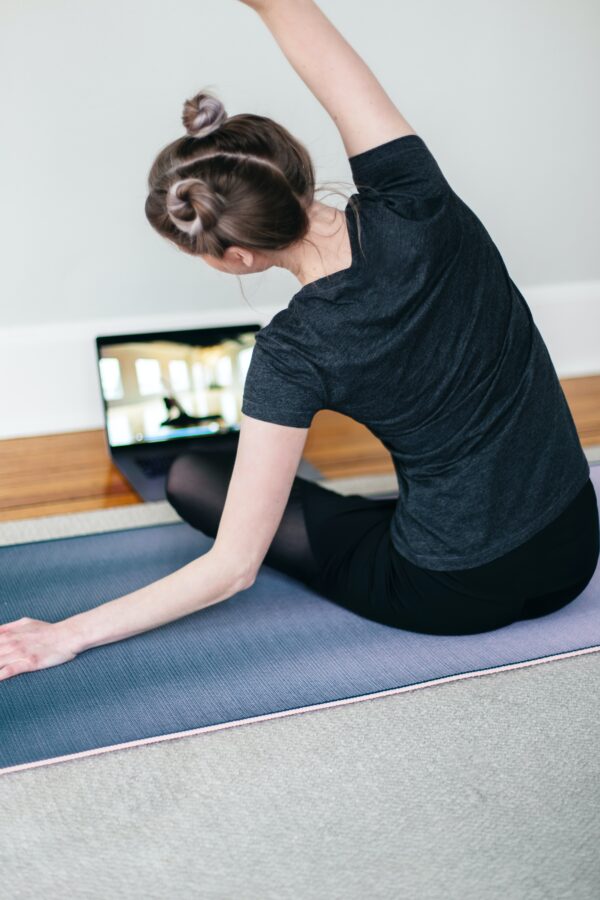
Let’s face it, the statement ‘we’re living in unusual times’ got boring a long time ago, and a lot of us (including myself) wouldn’t be against banning the word ‘unprecedented’ for at least 10 years. However, we are still definitely living in strange times. COVID-19 is far from gone, but the lifting of nearly all restrictions in the UK this summer means that many of us are at least trying to pick up our ‘normal’ lives again.
A lot of people are delighted by this, while others, with or without a chronic illness, have dreaded it.
I’d like to say I’m somewhere in between. I’ve enjoyed going back to an (almost empty) office rather than running meetings from my childhood bedroom. I’ve also loved seeing friends in real life, doing exercise classes that aren’t via Zoom and watching my partner get excited about seeing his family for the first time in over a year.
But I’ve also found myself feeling exhausted after an hour of socialising, missing my family after half a day out and often just wanting to curl up on the sofa, rather than doing any of the exciting things I’d been dreaming of since the pandemic began. I’ve even caught myself feeling nostalgic for the first lockdown of spring/summer 2020.
If any of that’s sounding familiar, stay with me, I’m about to spend the next few hundred words convincing myself that it’s actually completely normal to feel this way…
Why is coming out of lockdown so difficult?
 Going into lockdown was hardly easy, but in some ways, coming out of lockdown has been even more difficult.
Going into lockdown was hardly easy, but in some ways, coming out of lockdown has been even more difficult.
When the pandemic started, we all had to switch part of ourselves and our lives off without much warning.
Now, we’re expected to just switch everything back on, but it’s just not that simple. As early as June 2020, studies were showing the heavy impact that lockdown was having on mental health, particularly in terms of stress, depression and anxiety levels. Evidence suggests that this effect was stronger among young people and those with existing mental health issues, which is relevant to a lot of people with chronic conditions like arthritis.
With that in mind, it’s not surprising that many would find coming out of lockdown difficult. Imagine coming out of a dark cinema after an intense three-hour film with several gore scenes, only to find that it’s still the afternoon – you feel confused, disoriented and unsure how to get on with the rest of your day. That, multiplied by around one thousand, is how resuming normal(ish) life after lockdown feels.
Adding a chronic illness (or several) into the equation can make things even more complicated. A lot of people with autoimmune diseases like arthritis are immunocompromised, and for us, coming out of lockdown has felt like trying to navigate a minefield of germs, infections, flares and fatigue.
For me, this has meant I’ve often still missed out or not been able to properly engage with things, despite ‘freedom day’ having come and gone over a month ago. Clearly, my immune system didn’t get that message.
Because of the absolutely enormous treatment backlog facing the NHS in the wake of Covid, its also quite difficult to access proper help at the moment, which is a bit problematic when you need proper help a lot. As a chronic illness veteran about to celebrate my 15-year arthritis anniversary, I’ve seen my fair share of waiting lists, but the current three-year one I’m on is definitely a record.
Lockdown one nostalgia
I will fully admit to my privilege here, because for me lockdown didn’t mean financial insecurity, having to make a sudden career change or, worst of all, losing a loved one, which makes me incredibly lucky.
 Personally, the spring 2020 lockdown was the first time in as long as I can remember that I gave myself real permission to rest and explore things I enjoy. Both my physical and mental health improved a lot as a result. I always took my medication on time, I improved my flexibility and mobility through home exercise, and I had time to learn more about how to manage my condition and to connect with others with arthritis.
Personally, the spring 2020 lockdown was the first time in as long as I can remember that I gave myself real permission to rest and explore things I enjoy. Both my physical and mental health improved a lot as a result. I always took my medication on time, I improved my flexibility and mobility through home exercise, and I had time to learn more about how to manage my condition and to connect with others with arthritis.
The lifting of lockdown felt like a return of the pressure to keep up, fit in and perform. Real life is hectic and disorderly, and I quickly found myself dropping the good habits I’d picked up when there was nothing else to do. Then, as the November lockdown turned into a tier system, then into a third lockdown, spring/summer 2020 suddenly didn’t look so bad at all.
Am I seeing lockdown one through rose-tinted glasses? Absolutely. Is that unreasonable, given what’s happened since? Probably not.
Is it okay to miss lockdown?
I recently confessed all of this to a friend, after a particularly disastrous attempt to socialise with new people left me feeling like I wanted to nap for three days. I rounded it off by saying that I felt incredibly guilty for feeling nostalgic about the first lockdown, especially as I know a lot of people who really struggled during that time.
Instead of judging me or telling me to get a life, they told me something really comforting: that I wasn’t the first person they had heard say that.
That lots of people were also finding the end of lockdown to be confusing, tiring and quite demanding on undeniably rusty social skills. And that it wasn’t wrong to miss simpler times.
This isn’t really an advice blog, but there still might be a lesson here. Of course, no one would ever want to recreate the circumstances of the first lockdown, but that permission to rest and focus on wellbeing could definitely come in handy now.
